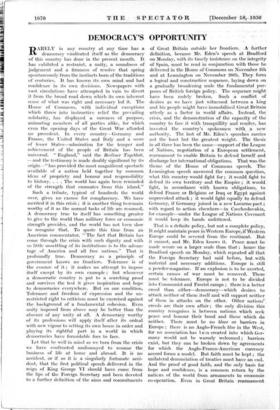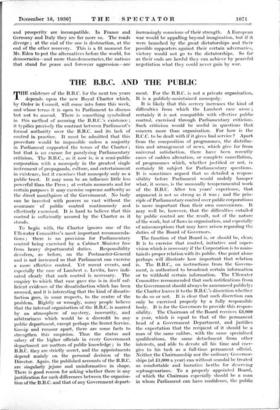DEMOCRACY'S OPPORTUNITY
RARELY in any country at any time has a democracy vindicated itself as. the democracy of this country has done in the present month. It has exhibited a restraint, a unity, a soundness of judgement and a firmness of resolve that spring spontaneously from the instincts born of the traditions of centuries. It has known -its- own mind and - had confidence in its own decisions. Newspapers with vast . circulations have attempted in vain to divert it from the broad road down which its own inherent sense of what was right and necessary led it. The House of Commons, with individual exceptions which threw into instructive relief the prevailing solidarity, has displayed a sureness. of purpose, animating members of all parties alike, for which. even the opening days of the Great War afforded no. precedent. In every country—Germany and France, the United States and Italy and a score of lesser States—admiration for the temper and achievement of the people of Britain has been universal. "England," said the Berliner Tageblatt, —and the testimony is made doubly significant by its origin—" has provided the most magnificent spectacle available of a nation held together by common ideas of propriety and honour and responsibility, to history. . . . The world has again been reminded of the strength that emanates . from this island."
Such a tribute, typical of hundreds the world over, gives no excuse for complacency. We have merited it in this crisis ; it is another thing to remain worthy of it as the normal tasks of life are resumed.. A democracy true to itself has something greater to give to the world than military force or economic strength provides, and the world has not been slow to recognise that. To quote this time from an American commentator, "The fact that Britain has come through the crisis with such dignity and with so little unsettling of its institutions is to the advan- tage . of America and all free nations." That is profoundly true. Democracy as a principle of government knows no frontiers. Tolerance is of the essence of it ; it makes no attempt to impose itself except by its own example ; but whenever a democratic country is put to a searching proof and survives the test it gives inspiration and hope to democracies everywhere. . But on one condition. Tolerance and freedom of expression and the un- restricted right to criticism must be exercised against the background of a fundamental cohesion. Even unity imposed from above may be better than the absence of any unity at all. A democracy worthy of its professions will apply itself after its ordeal . with new vigour to setting its own house in order and playing its rightful part in a world in which democracies have formidable foes to face.
Let that be well in mind as we turn from the crisis we have confronted undismayed to resume the business of life at home and abroad. It is no accident, or if so it is .a singularly iortunate acci- dent, that the first political speech delivered in the reign of King George yi should have come_ from the lips of the Foreign Secretary and been devoted to a further definition of the aims and commitments of Great Britain outside her frontiers. - A- further definition, becanse Mr. Eden's speech at Bradford on Monday, with its timely insistence on the integrity of Spain, must be read in conjunction with those he delivered in the House of Commons on November 5th and at Leamington on November 20th. They form a logical and constructive sequence, laying down on a gradually broadening scale the fundamental pur- poses of British foreign policy. The sequence might have been rudely. broken. Such a conflict of desires as we have just .witnessed between a king and his people might have immobilised- Great Britain utterly as a factor in world affairs. Instead, the crisis, and the demonstration of the capacity of the country to face it with tranquillity and resolve, has invested the country's spokesmen with , a new authority. The last of Mr. Eden's speeches carries not the least but the greatest weight. The thesis in all three has been the same—support of the. League of Nations, negotiation of a European settlement, rearmament to enable Britain to defend herself and discharge her international obligations. That was the theme of the House of Commons speech. The Leamington speech answered .the common question, what this country would fight for ; it would. fight to, defend its own territory and the Empire ; . it. .woulI. fight, in accordance with known obligations, to defend France ,or Belgium or Iraq or Egypt against unprovoked attack ; it would fight equally .to defend Germany, if Germany joined in a new Locamo pact ; with regard to action elsewhere—in Czechoslovakia, for example—under the League of Nations Covenant it would keep its hands unfettered.
That is .a definite policy, but not a complete. policy. It might maintain peace in Western Europe, if Ii_Ve4ern Europe could be severed from the continent. But. it cannot, and Mr. Eden knows it. Peace must • be made secure on a larger scale than that ; hence the . Bradford speech on Monday, which repeated all that the Foreign Secretary had said before, but with. material and necessary additions. Europe is.. still a powder-magazine. If an explosion is to .be averted, certain causes of war - must be removed. There must be • tolerance. Europe is not to be divided into Communist and Fascist camps ; there is a better creed than either—democracy—which desires to attack neither of them itself and will support neither of them in attacks on the other. Other nations' creeds are their own affair ; the only division this country recognises is between nations. which seek peace and honour their bond and those which do neither. There ,must . be no blocs or barriers in Europe ; there is no Anglo-French bloc in the West, for no association has lc ezn created into which Ger- many would not be warmly welcomed ; barriers exist, but they can be broken down by agreements for which the Anglo-Franco-American currency accord forms a model. But faith must be kept.; the unilateral denunciation of treaties must have an end. And the proof of good faith, and the only basis for hope and confidence, is a common return by the naticns,. of the world from armaments to economic co-operation. -Even in . Great Britain • .rearmament and prosperity are incompatible. In France and Germany and Italy they are far more So. The roads diverge ; at the end of the one is destruction, at the end of the other recovery. This is a fit moment for Mr. Eden to put the alternatives before the world, for democracies—and more than democracies, the nations that stand for peace and forswear aggression—arc increasingly conscious of their strength. A European war would be appalling beyond imagination, but if it were launched by the great dictatorships and their possible supporters against their certain adversaries, victory would not go to the dictatorships. So far as their ends are lawful they can achieve by peaceful negotiation what they could never gain by war.











































 Previous page
Previous page